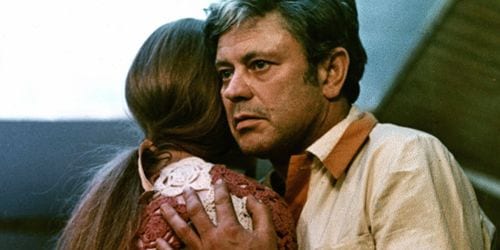
The 1972 Russian film Solaris, along with its 2003 American remake, is a haunting, disturbing experience. The original film, directed by Andrei Tarkovsky, has been reissued by Criterion in its original 2:35:1 aspect ratio with an uncut 166 minute run time. The Criterion release provides a clean video transfer with a mono soundtrack.
Based on a novel by Stanislaw Lem, Solaris is often cited as the Russian response to Stanley Kubrick’s classic 1968 film 2001, A Space Odyssey. Tarkovsky believed that science fiction was soulless and dehumanizing. In Solaris, Tarkovsky explores the nature of love and memory within the framework of the sci-fi genre.
Psychiatrist Kris Kelvin (Donatas Banionis) is assigned to a Soviet space station where the three-man crew is suffering from unspecified psychological trauma. After Kelvin arrives, he discovers that one crewmember has already committed suicide. Kelvin is warned by cosmonaut Snaut, “Just remember, there’s only three of us on this ship: you, me, and Sartorius.”
Yet that’s clearly not the case. Isolated in deep space, the crew is visited by dead loved ones, who inexplicably appear on the ship—not as ghosts or hallucinations but as living, breathing entities. “Let’s just call them our guests,” Snaut advises with a mixture of irony and horror.
As the space station orbits Solaris, an alien intelligence seems to read the memories and dreams of the cosmonauts, then recreates the objects of their powerful emotional attachments into physical form.
As Kelvin sleeps, his beloved wife Hari, dead for ten years, lies down next to him. In a brilliant sequence, as Hari lingers nearby, the three men of science discuss the beautiful woman before them. The scene is fraught with moral implications:
Sartorius: So far as I can tell, they’re constructed. While our structure is made of atoms, theirs consists of neutrinos.
Snaut: But neutrino systems are unstable.
Sartorius: They seem to be stabilized by Solaris’ force field. (Turning to Hari) A beautiful specimen…perfect.
Kelvin: You’re talking about my wife.
Sartorius: You should take a blood sample of your wife. It will sober you up a bit.
As the scene progresses, Kelvin grows more protective of Hari while Sartorius pushes a cold, clinical approach:
Sartorius: Are you capable of an autopsy?
Kelvin: That would be like sawing off my leg. I told you, she’s my wife.
Sartorius: I think an autopsy on her would be less questionable than experimenting on rabbits.
The film raises more questions than it answers. What moral criterion defines being ‘human’ and how should the crew treat their ‘guests’? The alien intelligence responsible for the guests—is it benign or malevolent? One possibility is that the guests are merely ambassadors from Solaris, their appearance designed to please the human explorers. However, the guests are strangely passive, as if they lack free will. Hari is terrified whenever she’s separated from Kelvin, as if her existence is closely tied to his perception of her.
Although groundbreaking for its time, there are problems with the original Solaris. At times the video switches to black and white for no apparent reason. Some critics claim Tarkovsky does this to alter the mood of the film. Yet this shift occurs randomly, as if Tarkovsky was over budget and forced to shoot footage in black and white.
The film’s first 30 minutes crawl by with pointless exposition, as the brooding Kelvin wanders the grounds of his father’s home. The KGB briefs him on the troubled Solaris mission via teleconference, yet they offer few specifics. Solaris lacks progression–it takes a half hour before Kelvin boards the ship. After his arrival, there are long stretches where very little happens. The 166-minute run time is too long and the film is badly in need of editing.
In addition, the special effects are so dreadful that it distracts even the most casual viewer. Rain is produced in the most amateur way imaginable, as if a stagehand is perched on a scaffold over the set, armed with a water hose.
In sharp contrast, the American remake, directed by Steven Soderbergh, clocks in at a tight 99 minutes. Soderbergh takes a scalpel to the script, providing the serious edit that the original screenplay needed thirty years ago. The remake begins in medias res. as Kelvin boards the ship five minutes after the opening credits. The remake also includes a top-flight cast (George Clooney, Natascha McElhone) and modern production values. The result is a concise, uncluttered film that effectively conveys the original’s eerie, unforgettable storyline.
The Criterion release of Tarkovsky’s Solaris includes a bonus disk with deleted and extended scenes as well as cast interviews. Natalya Bondarchuk, who was only 19 when she played Hari, pays homage to Tarkovsky’s method:
“When we look at a (Tarkovsky) landscape, we anticipate something will happen. Our attention becomes focused, like meditation. No one could show atmosphere like Andrei. To just show a landscape is a documentary. But if we see and hear something else, what the artist makes possible for us to see, that is art, and it bewitches us.”
